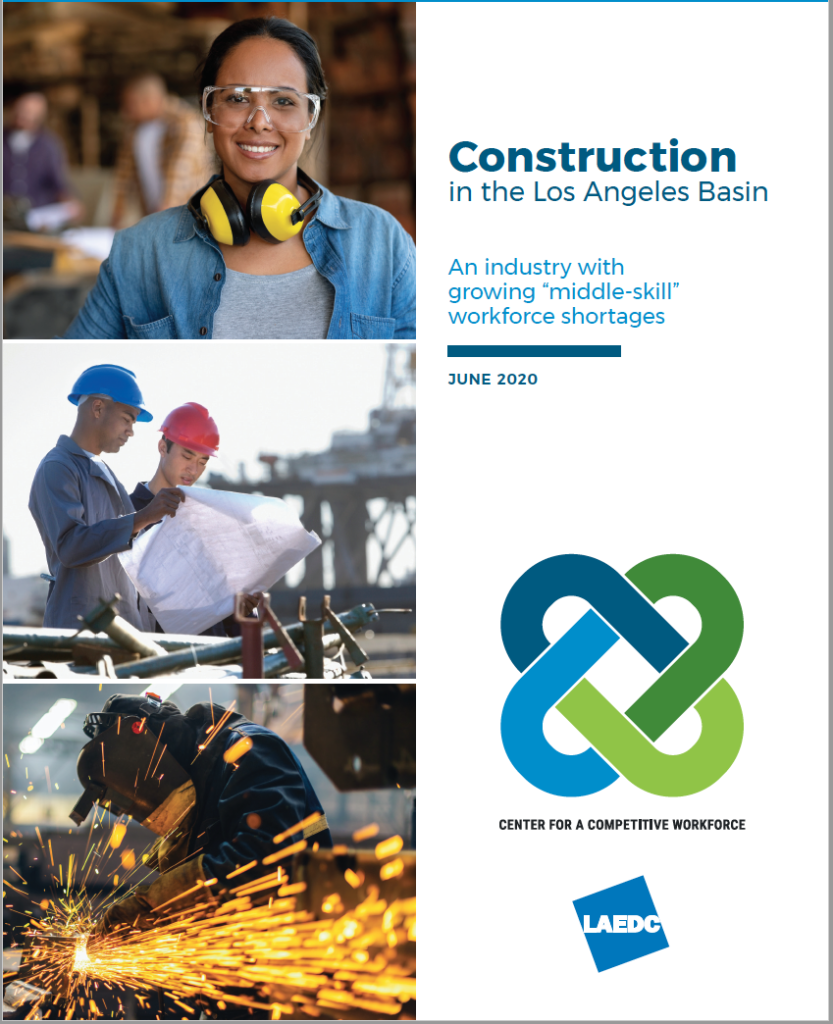CCW Construction Report
The Construction Industry in the Los Angeles Basin: An industry with growing “middle-skill” workforce shortages
The Construction Industry in the Los Angeles Basin: An industry with growing “middle-skill” workforce shortages
IN THIS REPORT, CCW:
 The partnership between our region’s community colleges and industry has never been more important. LAEDC, as the region’s economic development leader, is a strategic partner facilitating regional industry engagement efforts and providing the labor market research expertise from which good planning and data-driven decisions can be made. Together, the colleges and LAEDC are leading this important regional initiative to sustain our economy and deliver opportunity for students and businesses.
The partnership between our region’s community colleges and industry has never been more important. LAEDC, as the region’s economic development leader, is a strategic partner facilitating regional industry engagement efforts and providing the labor market research expertise from which good planning and data-driven decisions can be made. Together, the colleges and LAEDC are leading this important regional initiative to sustain our economy and deliver opportunity for students and businesses.
CCW convenes employers/industry and community colleges to promote collaboration and share insights on talent, technology and trends to strengthen the alignment of education and training that meets the needs of the rapidly changing industries that will dominate our economic future. This supports regional workforce development and employer engagement efforts, on behalf of the 19 colleges in the L.A. region, to better understand industry trends and the demands for talent, especially in middle-skill occupations, to ensure students and jobseekers are competitive for the jobs and careers of today – and tomorrow. The center’s work addresses the talent gaps employers face and the supply of skilled talent to meet projected workforce demand. CCW was founded as a Strong Workforce Program regional project of the 19 community colleges in the Los Angeles region, the L.A./O.C. Center of Excellence for Labor Market Research (COE), and the LAEDC and its Institute of Applied Economics. CCW has several work streams:
• Labor Market Analysis • Industry Councils • Regional Program Advisory Meetings • Work-Based Learning Partnerships • Company Visits and Career Videos • Workforce and Education Partners Portal • Bioscience Industry Portal
This CCW report, The Construction Industry in the Los Angeles Basin: An industry with growing middle-skill workforce shortages, is the 12th in a series of labor market and occupational reports since 2017. The purpose of this report is to analyze the major growth occurring in our region’s Construction sector, identify the jobs that have the brightest future for community college students in the region, and provide a wealth of information about talent needs to inform faculty, students, job seekers and others in the workforce development system. With this report as a guidepost, CCW seeks to facilitate industry-college engagement and partnerships including work-based learning, talent pipeline development and exchange of ideas.
L.A.’s construction industry represents a promising opportunity because it supports many middle-skill occupations — and the demand created by job openings is forecast to be substantial, with a workforce shortage likely.
L.A. Basin’s construction industry is forecast to experience steady growth during the next three to five years as the region faces a deepening housing supply crisis and strives to meet ambitious environmental goals. The L.A. Basin cannot meet these co-equal demands without training and hiring enough builders, cost estimators, carpenters and other essential construction industry workers.
• Almost 55 percent of the 169,100 construction industry openings over the next five years will be in middle-skill occupations
• Based on regional community college completions, there will be a projected undersupply of about 7,500 construction industry workers in identified occupations each year over the next five years in the L.A. Basin, as the community college supply is not adequately meeting workforce demand in most of the targeted middle-skill occupations.
• The high percentage of middle-skill jobs that comprise the construction industry and the strong projections for growth in middle-skill opportunities over the next five years makes prioritizing this industry for the development of training and educational programs particularly compelling for L.A. Basin community colleges.
Construction employs 238,530 workers in the LA Basin across all educational attainment levels, and pay averages higher than to the combined average of all industries in the LA Basin.
There will be more than 169,000 construction job openings in the LA Basin over the next five years, with employers seeking to fill many of those openings with middle-skill workers.
Of all the construction industry openings over the five-year period, just under 55 percent will be in middle-skill occupations requiring some college education such as an associate degree or a nondegree award or certificate; this reinforces the selection of this industry as a valid target for community college programs
In the ten target occupations profiled in this report, there will be, on average, more than 13,000 job openings annually over the next five years.
Employees in construction earn, on average, $77,060, an annual wage premium of close to $16,000; the regional average across all industries is $61,510. However, individual wages vary widely by occupation.
The Specialty Trade Contractor subsector employs the most workers in the L.A. Basin’s construction industry with nearly 160,000 workers employed in this industry subsector, and growth is expected to continue with a projection of an additional 8,770 net jobs over 5 years (5.5 percent)
There may be an annual undersupply of 7,500 community college students to fill the ten target construction occupations because only 1,773 awards were conferred in 2018-2019, versus 9,260 annual openings across all industries.
Real wages in the Utility System Construction industry and Building Finishing Contractors industries grew by 11.3 percent and 10.3 percent, respectively, over the last decade.
Within the construction industry, CCW has identified ten target construction occupations with good wages and significant job openings, for community colleges to train students:

What they do:
Construct, erect, install, or repair structures and fixtures made of wood, such as concrete forms; building frameworks, joists, studding, and rafters; and wood stairways, window and door frames, and hardwood floors.
Wage: $25/hr.

What they do:
Install, maintain, and repair electrical wiring, equipment, and fixtures. Ensure that work is in accordance with relevant codes. May install or service street lights, intercom systems, or electrical control systems.
Wage: $30/hr.

What they do:
Assemble, install, alter, and repair pipelines or pipe systems that carry water, steam, air, or other liquids or gases. May install heating and cooling equipment and mechanical control systems including fire sprinklers.
Wage: $25/hr.

What they do:
Install or repair heating, central air conditioning, or refrigeration systems, including oil burners, hot-air furnaces, and heating stoves.
Wage: $28/hr.

What they do:
Operate power construction equipment, such as motor graders, bulldozers, scrapers, compressors, pumps, derricks, tractors, or front-end loaders to excavate, move, and grade earth, erect structures, or pour concrete.
Wage: $39/hr.

What they do:
Fabricate, assemble, install sheet metal products and equipment, such as ducts, control boxes, drainpipes, and more. May setup and operate fabricating machines to cut, bend, and shape metal;; operate soldering and welding equipment; or inspect and smooth seams.
Wage: $24/hr.

What they do:
Use hand-welding, flame-cutting, hand soldering, or brazing equipment to weld or join metal components or to fill holes, indentations, or seams of fabricated metal products.
Wage: $18/hr.

What they do:
Raise, place, and unite iron or steel girders, columns, and other structural members to form completed structures or frameworks. May erect metal storage tanks and prefabricated metal buildings.
Wage: $27/hr.

What they do:
Prepare detailed drawings of architectural and structural features of buildings or drawings and topo maps used in civil engineering projects, such as highways and bridges. Use knowledge of building materials, engineering practices, and mathematics.
Wage: $29/hr.

What they do:
Inspect structures using engineering skills to determine structural soundness and compliance with specifications, building codes, and other regulations. Inspections may be general in nature or specific such as electrical or plumbing.
Wage: $43/hr.
• There is some urgency for the creation and expansion of community college programs targeting middle-skill occupations within the construction industry
• Programs that offer opportunities for students to get apprenticeships and on-the-job experience in middle-skill jobs within the construction industry should be prioritized
• Construction industry occupations exhibiting the most robust growth have the shared characteristic of being driven by an expertise in manual skills that are difficult to replace through automation
• Changes in regulations and advancements in “green” technology mean that workers need to remain knowledgeable of evolving products, rules and practices; for example, increased attention paid to regional and state regulatory policies (safety, environmental, land use) and integration of those policies into coursework will also help community colleges prepare students to meet the industry’s growing needs
• Immediate attention should be directed by the community colleges toward component industries within the construction industry where the greatest amount of growth is expected to occur:
• building equipment contractors and building finishing contractors will add a combined 6,005 jobs to the region by 2022
• residential building construction will add 1,700 new jobs to the region by 2022
• As college programs are developed and modernized, technical training should be a top consideration, so partnerships should be formed with industry stakeholders to update and/or expand programs in construction occupations where the adoption, absorption and deployment of technology changes more frequently, such as in heavy and civil engineering construction
In addition to the specific skill sets within each of the construction occupations, there are general competencies that will be required of many workers moving forward. These include:
Workers with strong critical thinking
Interpersonal and communication skills, because effective communication, relationship-building and client interaction and support will be greatly emphasized and set the stage for career ladder advancement
Shannon Sedgwick, Director of LAEDC’s Institute for Applied Economics, and primary author of the construction report, presented the following slides to community college leaders to frame the key points of the report.
View and share here: Construction Report Release Slides
After clicking the links near the top of this page to read the full report or the highlights version, please explore this website. CCW works with the community colleges and industry partners, to help establish work-based learning partnerships and pathways, to enable conversations about scale and content of college programs to meet the hiring demand in industry. In addition the CCW partner portal serves as regional infrastructure to efficiently connect students and employers, so they can share job leads, work-based learning opportunities and resumes, on a Salesforce community platform.
CCW brings LA’s Industry, Talent, and Community Colleges together to be more demand‐driven, industry responsive, future‐forward and adaptive.
Start by asking a question and we are happy to point out high value ways you can use CCW to your advantage:
Reach out to: Isabel.Duran@laedc.org or claire.anderson@laedc.org